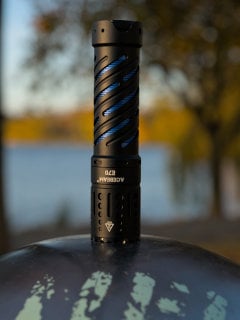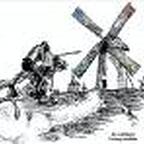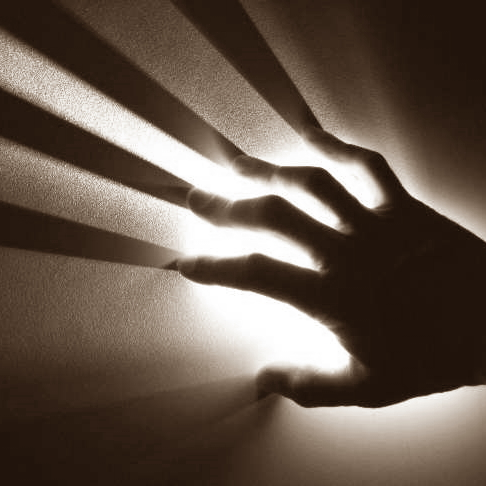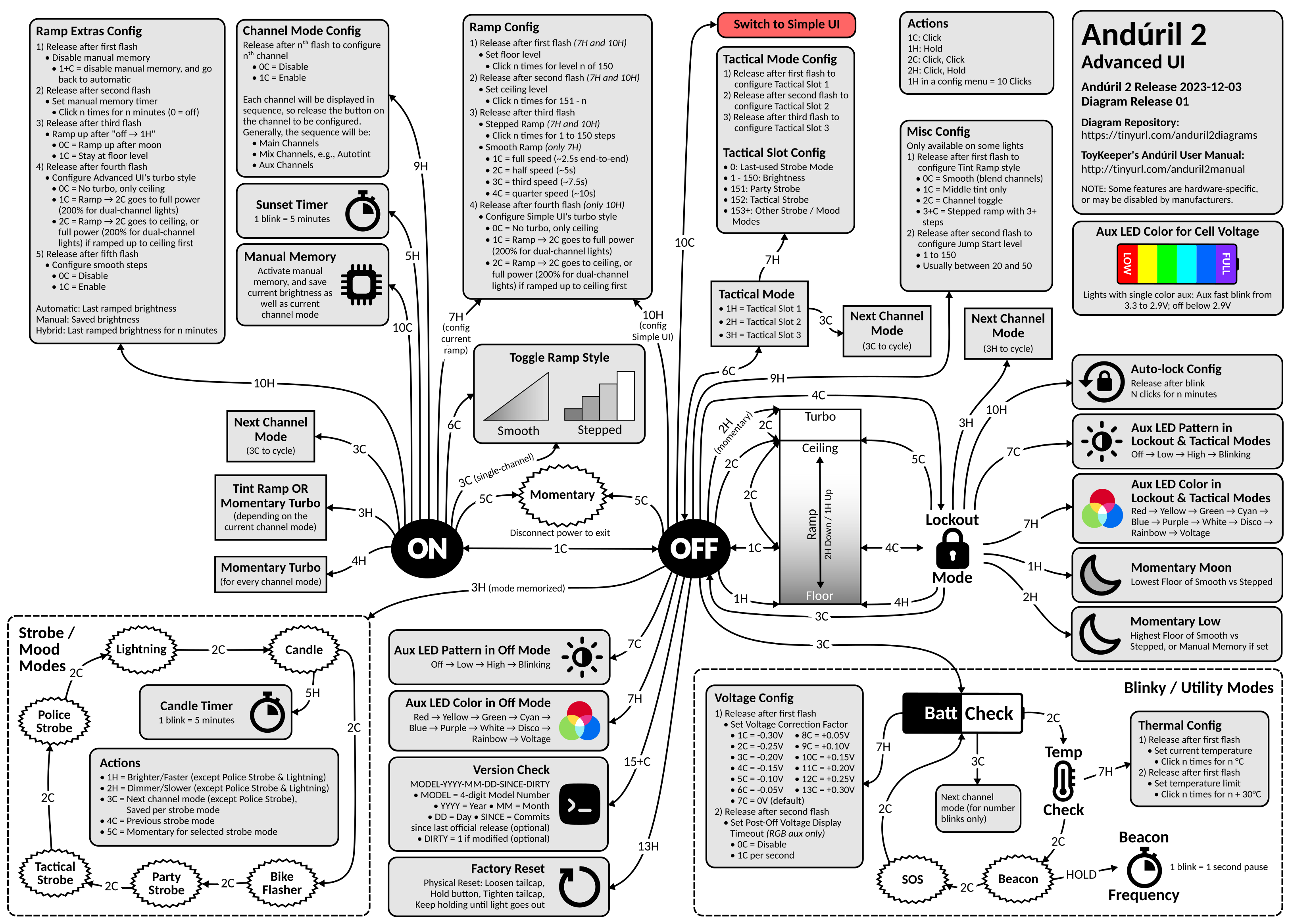
Advanced UI
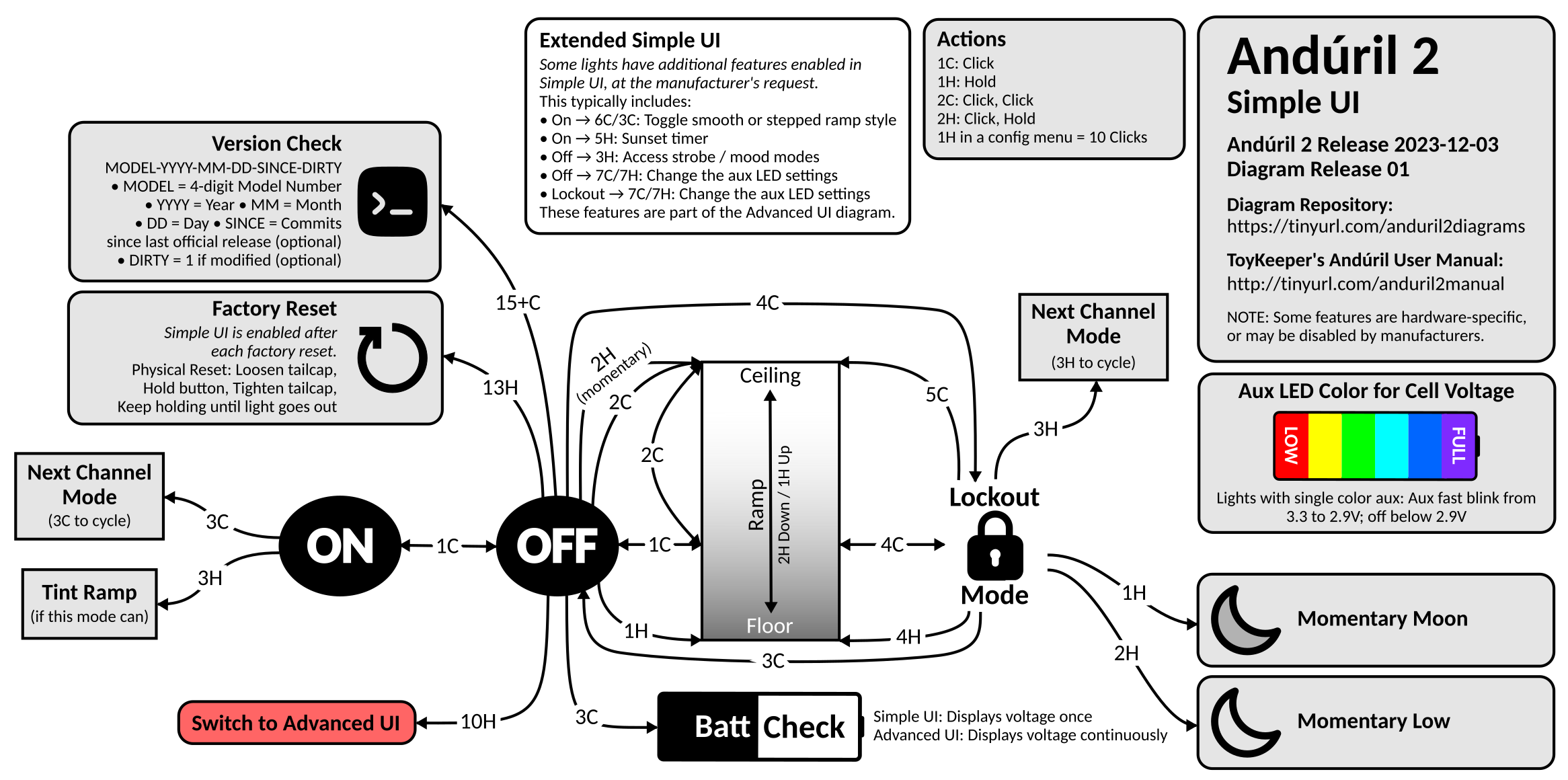
Simple UI
Background: This was 100% inspired by Lux-Perpetua’s Andúril 2 UI diagram on BLF. In fact, Lux’s diagram is so good, that I would have been happy to just use it except for one thing: the source isn’t published, so you can’t modify it. I also wanted to be able to keep it up to date with u/ToyKeeper’s code. So I created my own…
This is where I intend to store all of my Anduril 2 UI diagrams, and any updates to them. Since ToyKeeper split off the multi-channel version of Anduril 2, I have created two new diagrams for it:
Anduril 2 Multi-Channel Advanced UI (PNG)Anduril 2 Multi-Channel Simple UI (PNG)
Diagrams now hosted on GitHub.
Yeah, it got complicated enough that I could no longer fit the Advanced and Simple UI diagrams on a single page, so I had to split them.
As always, you are free to do whatever you want with these diagrams. I make these for myself, and I’m happy to share them with the community. You can find the source MS Visio file here. Feel free to make your own copy and modify it to your heart’s content. The Visio file contains several pages:
Single-Channel - Advanced/Simple UI diagram for the single-channel version of Anduril 2. I still need to update and post it.Multi-Simple - Simple UI diagram for the multi-channel version of Anduril 2.Multi-Advanced - Advanced UI diagram for the multi-channel version of Anduril 2.Diagram Parts - Various bits and pieces that I use in the various UI diagrams.
If you find any errors, please post a comment here. I try to keep the diagrams as accurate and up-to-date as possible, but you know, life happens. Enjoy!
Updates:
- 2023-07-06: Fixed several issues pointed out here. Thanks @lowprofile!
- 2023-07-09: Fixed a few more issues pointed out here. Thanks again @lowprofile! Also trying to get the wording in a few places more inline with the text manual.
- 2023-07-15: Updated for r728 which added channels for red, yellow, green, cyan, blue, purple, and white. Added 4H from ON to Momentary Turbo. Added 3C from Tactical Mode to Next Channel Mode. Several other minor fixes. Huge thanks to @lowprofile for continuing to provide valuable feedback. This multi-channel diagram has been a journey!
- 2023-07-17: Multiple visual enhancements/fixes thanks to @lowprofile. Incremented the version to r732 even though there were no material impacts to the diagram.
- 2023-07-20: Modified the ramp part of the diagram to reflect the default Anduril 2 configuration (2C to Ceiling). Thanks again to @lowprofile for feedback. I also switch from revisions to build dates as suggested by ToyKeeper.
- 2023-07-22: Made several corrections to the Simple UI diagram that I had been neglecting. Also made a slight wording change to the ramp config boxed on the Advanced UI diagram. Thanks to @lowprofile for all corrections. Finally, I incremented the build date to 2023-07-21, although there were no material impacts to the diagrams.
- 2023-08-06: Several cosmetic fixes to the Simple and Advanced UI diagrams thanks to feed back from @lowprofile. Also incremented the build date to 2023-08-04, although there were no material impacts to the diagrams.
- 2023-08-07: Several clarifications thanks to feedback from @lowprofile. Also incremented the build date to 2023-08-07, although there were no material impacts to the diagrams.
- 2023-08-10: Several cosmetic fixes to the Simple and Advanced UI diagrams thanks to feed back from @lowprofile.
- 2023-10-03: I’m embarrassed to admit that I missed an update from the 2023-08-27 release in which “smooth steps” were added (see the Ramp Extras Config). Other than that, there have been no material changes to the diagrams.
- 2023-11-07: I finally got around to making a couple of updates suggested by @lowprofile. In the Strobe Modes on the Advanced UI diagram, you’ll notice that 3C allows you to save the channel mode per strobe mode. Very cool!
- 2024-01-01: Last update here on Lemmy. Lemmy is great, but it makes more sense to host the diagrams on GitHub when I can issue diagram releases corresponding with ToyKeeper’s Anduril 2 releases. From now on, please access the diagrams there. It’s a fairly significant update, so please be sure to read the README.
You did it!
You know anduril 2 would not be manageable without you at the moment. It’s great that toykeeeper holds a changelog and repo, but without this, I would just have had convoys or something instead.
Please post the same link on r/flashlights if you haven’t already, just to inform people that there is an update graphicalized, and. That there’s a new Reddit in town! ;)
Yeah, I added a final update to my post on Reddit to let folks know that everything has moved here.
Nice work, thanks for the diagrams.
Thank you very much! With your new chart, you have succeeded in adding all the features I used to use the manual for.
This is beautiful, thank you
Great work, thank you very much! A couple of details I noticed in this detailed diagram (Advanced UI):
-
If I am not mistaken, for 3C from ON, Change Channel,
50/50comes before, not afterTint Ramp, so the present order should be corrected. -
For the Strobe Modes,
Police StrobeandTactical Strobeshould be in the opposite order, asTactical Strobecomes beforePolice Strobe. -
Furthermore, in Strobe Modes, the
Actionscould include3C: Change Channel. -
Also, for Lockout Mode,
3HforChange Channelcould be added, possibly below 1H and 2H. -
Finally, maybe it is useful (if not too much detail) to specify what the two
Momentary Floor, 1H and 2H in Lockout Mode, refer to. For1Hit could readMomentary Floor (lowest Floor of Smooth vs Stepped), and for2Hit could readMomentary Floor (highest Floor of Smooth vs Stepped), or Manual Memory if set.
Thanks so much for the feedback. I corrected #1, 2, 3, and 5 in the diagram for the Advanced UI. I can’t get #4 to work on my dual-channel D4V2. It looks like it’s changing channels, but it switches back to the original channel almost immediately. Are you able to get this working on a light? How is it supposed to behave?
The updated diagram is looking very good, thanks! And yes, I had #4 working just fine, but I checked again, and it is not working with every Anduril 2 version. I do not want to overcomplicate this, but as the Anduril 2 multi-channel branch is in active development, a little extra detail seems to be in order here:
I am checking this with two D2s (but apparently, so far I only checked 3H in Lockout Mode with the first one of them):
-
First D2: Running
anduril.emisar-2ch-aux.hexby SiteRelEnby, as referred to in this Reddit post (there is also a Lemmy post, but that one does not include the GitHub links added at the top), version0135-2023-07-03(new version format). -
Second D2: Running
anduril.2023-04-25.emisar-2ch.hexfrom ToyKeeper’s /torches/fsm/anduril2, version2023-04-26-0135(old version format); please note: at the same site, also the newer versionanduril.2023-05-30.emisar-2ch.hexis available.
Back to #4:
3Hin Lockout Mode forChange channelworks with the first D2, but not with the second D2.(By the way, the newer Anduril 2 version of the first D2 also added aux LED channels to
Change Channel,3CfromON. This might be another addition to the diagram in the future, adding seven more channels, one each for red, yellow, green, cyan, blue, purple, and white aux LEDs. For example, I disabled all the aux LED channels via9HfromON, but for the blinky modes,3CfromBattCheck, I set white aux LEDs.)As
3Hfrom Lockout toChange channelis in ToyKeeper’s text manual, which is my point of reference, I guess it should also be in the diagram; cf. the UI Reference Table at the end:Lockout Any 3H Next channel mode (if more than one enabled)
And on to #3: Arguably, this should read
3C: Change channelrather than presently3C: Change channel for strobe modes, as this channel change is not limited to the strobe modes, but extends toONas well. The same goes for3HfromLockout, #4, which accordingly should also readChange channel. Both of these only show the enabled channels, not the disabled ones.And both of these differ from
3CfromBattCheck, which shows all the channels, enabled as well as disabled ones, and which is indeed limited to the blinky modes, so the present additionfor blinky modesinSwitch channel for blinky modesis correct. Cf. also the(for number blinks only)in the UI Reference Table at the end of ToyKeeper’s text manual:Batt check Full 3C Next channel mode (for number blinks only)
Thanks for the continued feedback. I somehow missed 3H from lockout in the text manual the first time around. Even though I can’t get it working properly on my D4V2 at the moment (hex compiled directly from ToyKeeper’s r725 code), I included it. I assume it’ll be fixed soon.
I also changed the wording slightly for channel switching to be more inline with the text manual, so now it reads “next channel mode” in a few places.
I’m a little confused about the feature to use 3C to cycle through the aux LED colors. So on my D4V2 which has RGB aux, would 3C turn on, for example, the red aux as the main emitters? For now, I added “Aux LED Channel(s)” to the Next Channel Mode boxes, but I don’t know if that’s appropriate. Take a look, and let me know what you think. Thanks!
Excellent, and thanks again for your work! This is the only diagram I am aware of that is displaying the (many) new Anduril 2 multi-channel features, and I consider this diagram to be a great contribution to the community.
As there are so many details to pay attention to, and things can get somewhat confusing, I will go along the individual points. For each of them, I will lay out what the two D2s at my end are doing.
The first D2 has remained as described above, running
anduril.emisar-2ch-aux.hexfrom SiteRelEnby, version number0135-2023-07-03.The second D2 is now updated to the latest version from ToyKeeper’s site, running
anduril.2023-05-30.emisar-2ch.hex, version number0135-2023-05-30.3Hin Lockout Mode forNext Channel Mode: First D2: working. Second D2: working (but not for the aux LED channels).
The wording
Next Channel Modelooks good to me, also for3CfromON, and it is in line with the text manual.The
Aux LED Channel(s)work in the first D2, but not in the second D2. The aux LEDs indeed work as the main emitters in this situation, and as far as I have observed it is ON/OFF with one (high aux) brightness. As to whether to include theAux LED Channel(s)in the diagram for3HfromLockoutand for3CfromON, I would suggest: presently No. Although ToyKeeper’s text manual apparently does not specify the channel modes, cf.A light can have many different channel modes, so don’t be shy about turning off any modes you don’t use. It makes all the others easier to reach.
at least for the .hex from ToyKeeper’s site these seem not be included at present, so including them might cause unnecessary confusion. They could simply be added at a later point in time. Then, for consistency, also the
Channel Mode Config,9HfromON, would have to include the aux LED channels (seven, adding up to 12 channel modes).3C: Next channel modein Strobe Modes: First D2: working. Second D2: working.
All fine here (one detail I observed is that the police strobe runs with red and blue aux LEDs in the first D2, but with Channel 1 and 2 in the second D2, just an observation, nothing to be included in the diagram).
3Cfrom Batt Check forNext channel mode (for number blinks only): First D2: working. Second D2: sort of working (?).
Again, the new wording looks good to me, and it is in line with the text manual. Actually, it is clearer than before, when it referred to the blinky modes rather than the number blinks, as this channel change only applies to Batt Check and to Temp Check, not to Beacon and SOS. Within the
Blinky/Utility ModesI had interpretedBlinkyto refer to Batt Check and Temp Check, andUtilityto refer to Beacon and SOS, but I might have misconstrued that. However that may be, referring to(for number blinks only)in the diagram clears that up.The first D2 cycles through all the channel modes, enabled as well as disabled ones, and choosing a channel mode is indeed limited to the number blinks only (and also includes e.g.
Version Check,15C). This is in line with the text manual.But with the second D2,
3CfromBatt Checkworks just like3CfromON,3CinStrobe Modesand3HinLockout Mode, i.e. it only cycles through the enabled channels, and choosing a channel change extends toONetc. and is not limited to the number blinks only. This is not in line with the text manual.In this case, I would suggest to give priority to the text manual and leave the current wording in the diagram as it is.
PS: With the latest revision 728 from yesterday, 2023-07-10, as far as I can tell, ToyKeeper now integrated the 7 aux LED channel modes into the emisar-2ch build.
With this, I would now suggest to include the aux LED channel modes in
Next Channel Mode,3CfromON, and leave the presentAux LED Channel(s), or ratherAux LED Channels, in the diagram; there might be no need to individually specify the 7 aux LED channel modes: Red, Yellow, Green, Cyan, Blue, Purple, White.And for
Channel Mode Config,9HfromON, to save space by not adding 7 additional points, there could e.g. be one additional point6+) Release after sixth+ flashandConfigure channel 6+.Moreover, I noticed a couple of other details in the diagram, and I will post a new comment for those. With all the current additions, I figure it is expected to take a little while to get everything up to speed.
UPDATE 2023-07-14: I checked with r728 (hex compiled directly from ToyKeeper’s code), and indeed, the 7 aux LED channel modes are now integrated into the emisar-2ch build. One difference I observed compared to SiteRelEnby’s version from above is that the 7 aux LED channel modes are not enabled, but rather disabled by default (which I would have suggested as well).
Yes! It’s working on my D4V2! I updated the Channel Mode Config as you suggested (mostly). I’ll have the updated version posted shortly. Thanks again for the recommendations!
Excellent, looking very good! Thanks again!
-
-
Superb work, reminds me that I should update my lights again sometime.
Here are some additional details:
-
Advanced UI: In Strobe Modes, Actions,
3C: Next channel modeis not a function for Police Strobe (which makes sense, as Police Strobe uses more than one channel on its own), so it could read3C: Next channel mode (except Police Strobe). -
Advanced UI: In Strobe Modes, Actions, instead of presently
4C: Previous mode, it could read4C: Previous strobe mode, to clearly distinguishstrobe modefromchannel mode. This wording would also be in line with the text manual. -
Advanced UI: In line with #2, in Strobe Modes, Actions, instead of presently
5C: Momentary for selected mode, it could read5C: Momentary for selected strobe mode. -
Simple UI: As an idea, maybe it would be useful to add two lines of information below (or next to)
BattCheck, Line 1:Simple UI: once, cf. text manual, and Line 2:Advanced UI: continuously. This distinction can serve well in determining whether the current UI is Simple UI or Advanced UI, even the more so with the recent developments in hank-cfg.h, where the modified Simple UI now allows ramping toggle as well as aux config and strobe modes.
Fixed all. Might be a little wordy on #4, so let me know what you think. I think it’s a really useful add, and I wanted it to be clear. Thanks!
All looking very good to me, thanks! #4 is very clear this way, and suitably located.
-
Excellent work! This is super useful
Idea for the initial post (showing on top): Maybe it would be useful to also have the diagram (PNG) for Simple UI show up? As far as I can tell, there is one image that can function as a thumbnail at the very top (should probably just stay the Advanced UI PNG, as presently), but maybe in the text below, either the Simple UI PNG or both, Advanced UI PNG and Simple UI PNG, could be displayed (displaying both underneath each other would show them together and make clear that they belong together; and Anduril novices might want to start off with the Simple UI diagram and could see that one right away). This way, the Simple UI diagram would get more and immediate attention as well.
This is going to sound silly, but I didn’t realize that I could post in-line images. I added both per your suggestion, and it’s much more functional. Thanks for getting me to finally look into it!
Awesome! (and nothing silly here) :-)
Here are some suggestions for Simple UI (multi-channel):
-
Version Checkshould be15+Cinstead of15C, consistent with Advanced UI, cf. also the text manual. -
Version Checkshould be in the new formatBBPP-YYYY-MM-DD, consistent with Advanced UI. -
In the Ramp image, the text should read, from bottom to top,
2H Down / 1H Up, again consistent with Advanced UI. -
Toggle Ramp Style,6CfromON, should be removed, as this is not a Simple UI function in unmodified Anduril 2, cf. the text manual. -
2HfromOFFfor momentary ceiling should be added, cf. the text manual.2HfromOFF, for consistency with Advanced UI maybe with(momentary), could possibly be added below (or above)2CfromOFF.
UPDATE 2023-07-22:
3Hfrom Lockout Mode forNext Channel Mode (3H to cycle)should be added as well, cf. the text manual. So many details to pay attention to … :-)
I had been neglecting the Simple UI diagram apparently. I fixed all points, and rearranged it slightly to make it a tiny bit more compact. Thanks again for all of the corrections.
Thanks, and the more compact style is looking very good!
-
Still my favorite diagram. Thx containerfan !
For your consideration, here are some more suggestions (Advanced UI):
-
Add
4HforMomentary Turbo, possibly below the present3HforTint Ramp OR Momentary Turboon the very left; cf. text manual. This4His esp. for channel modes that use3HforTint Ramp, but I have checked this4HforMomentary Turboto work in all channel modes, including those with already3HforMomentary Turbo, i.e. withoutTint Ramp. -
In the Strobe Mode Actions, add
Police Strobeat1H: Brighter/Fasterand2H: Dimmer/SlowerbeforeLightning, in order to read(except Police Strobe and Lightning), cf. text manual. -
Believe it or not,
3CforNext Channel Modealso works in Tactical Mode (6CfromOFF), I checked. I suppose this is covered by “Any Mode” in the text manual. So3CforNext Channel Modeshould also be added to Tactical Mode. -
As to the diagram layout for #3, to save some space, it might be sufficient to just write
Next Channel Mode (3C to cycle)for Tactical Mode, without listing all the individual channel modes once again. -
Relating to #4, as to the diagram layout, to save some space, it might also be sufficient to just write
Next Channel Mode (3H to cycle)for Lockout Mode. The individual channel modes are already listed at3CfromON, so they might not have to be repeated here again. At the same time, this would free some space for the Ramp image, which has been shrinking quite a bit due to the added3Hbox for Lockout Mode. -
Relating to #5, possibly place the
3Hfrom Lockout Mode below1Hand2H, visually somewhat separated from10H,7C, and7H, as this3Hnot only refers to Lockout Mode, but extends toONas well. -
Use
15+Cinstead of presently15CfromOFFforVersion Check, cf. text manual. I am always glad to not have to count to exactly 15 when doing a version check. -
While at it, in Ramp Extras Config, Item 1, use
1+Cinstead of presently1C = disable ..., cf. text manual “(doesn’t matter what value the user enters at the prompt)”.
I’m still in the process of making changes, but here’s what I’ve done so far…
- Added 4H for Momentary Turbo
- Added Police Strobe before Lightning
- Added 3C for Next Channel Mode from Tactical Mode.
- Took your advice and trimmed Next Channel Mode down to save space.
- Took your advice and trimmed Next Channel Mode down to save space. Enlarged the Ramp image to use some of that space.
- I agree with your recommendation, but I just can’t squeeze the Next Channel Mode in there.
- Changed 15C to 15+C
- Changed 1C to 1+C
Excellent recommendations, and I appreciate your help. Now working on the channel modes…
Great, thank you very much! What a beast of a diagram, and all is looking fine to me.
Possibly, if not too much hassle, as to #5 and in particular as to the Ramp image, a few visual suggestions, since to me the Ramp image looked a little clearer in previous diagram revisions:
a. Am I correct in assuming that the arrow from
2HfromOFF, momentary Turbo, now does not point to the same level as the arrow from2Cfrom Ramp anymore on purpose? This might just take a little while to get used to, yet visually, this might look like the two arrows are pointing to differing brightness levels. Maybe have them point to the same level at the very top of the Ramp image again?b. Moreover, the arrows from
2CfromOFFas well as from5CfromLockout Modenow appear to point to a level slightly above the Ceiling level line, which might lead to a slight visual disorientation as well. Maybe have them point straight to the Ceiling level line in the Ramp image again?c. This might have come up before, but lastly, it struck me as odd that in the Ramp description, it reads
1H Up / 2H Downfrom bottom to top, with the arrow next to1H Uppointing down to Floor, and the arrow next to2H Downpointing up to Ceiling. Maybe have it read the other way around,2H Down / 1H Upfrom bottom to top?d. Speaking of visual matters: The timer symbol in
Candle Timerhas been squeezed horizontally in the current diagram revision. In previous diagram revisions, it used to have the same shape as inSunset Timerand inBeacon Frequency. Maybe straighten theCandle Timersymbol again?e. Totally unrelated, this also caught my eye: With the slightly changed visual arrangement, the text
3H (mode memorized)fromOFFfor theStrobe Modeshas meanwhile come very close to the textDisconnect power to exitforMomentary. Maybe move the text3H (mode memorized)a bit to the left to visually separate the two texts?I really need to do a better job of QC on this diagram as it gets more complex…
a. You are correct, and I have fixed it.
b. Correct again. Resizing that Ramp diagram wreaked havoc!
c. I had adapted this from Lux-Perpetua’s original diagram, but I see what you mean. I changed it per your suggestion, and it does make more sense.
d. Yep, I squeezed the symbol unintentionally when shrinking the text box. Fixed.
e. Excellent suggestion! I don’t know why I had it all stacked in there. Fixed.
I also noticed that ToyKeeper has issued four more revisions since yesterday, but I don’t believe that any of them impact the diagram.
As always, thank you for the feedback on the diagram. I need folks like you to help me keep it straight.
Awesome, thanks! I am happy to help.
And I did not notice an impact on the diagram in ToyKeeper’s latest four revisions either.
-
Here is a wording suggestion for Advanced UI (multi-channel): For
Ramp Extras Config,10HfromON, as well as forRamp Config,10HfromOFF(config Simple UI), both Item 4,2C, maybe it should readif ramped up to ceiling first, or, if that does not fit into the line,if ramped up to ceiling, instead of currentlyif already at ceiling.This would be in line with the text manual, and it would also be more accurate. This is because the brightness will indeed ONLY go up to turbo via
2Cif ramped up to ceiling first, not for example if2Cis used to go up to ceiling; in that case, although “at ceiling”, another2Cwill go back to the previous brightness level, and not up to Turbo.Good clarification. Fixed! Thanks!
Thanks again!
I also wanted to be able to keep it up to date
thanks for all your efforts, very helpful
fwiw, I just received an Emisar D2 and did a version check that resulted in:
2021 12 13 0135
it uses 3H to change channels, not 3C…
I am trying to learn to reflash the D2 to a later version, but have not figured it out yet. I also dont know which hex file to update to, yet. update, found it: http://toykeeper.net/torches/fsm/anduril2/anduril.2023-04-25.emisar-2ch.hex
Do you have a flow chart for the existing stock firmware on the D2? (I dont know what revision that would be)
Unfortunately, I have not been keeping historical versions of the diagrams. I checked the file on Dropbox, and it only goes back a month (to a July 9th version of the diagram for r725 which still uses 3C to change channels). Someone once suggested that I use GitHub to track changes for things like this, so I may look into it in the near future.
I don’t have a D2, but I believe that it uses the same firmware as the D4V2 dual-channel. This would be the latest version from earlier this week (08/07). Once you get on the latest version, my diagrams should apply.
This would be the latest version
saved, thank you very much for all your help ;-)
Question/suggestion: If not too much hassle (I am running Linux, and I am not familiar with MS Visio), would it be possible to add a .pdf version of the diagrams below the .png versions?
The .png files are high resolution and are great esp. for on-screen viewing, but for printing, esp. in larger formats given the diagram complexity, .pdf will still be more suitable than .png.
Actually, this could be one single .pdf file with 2 pages, one for Simple UI and one for Advanced UI, and this .pdf file could then be printed double-sided, or one specific page only, as preferred.
Just added a PDF link. Let me know how it works out for you.
Thank you very much for adding the .pdf version!
Unfortunately, as far as I can tell, there are several issues with the .pdf version that would need to be addressed, and I am not sure if that is worth the trouble, as this could turn into a project of its own. :-)
Obviously, it would be fantastic to have a source file from an open source, cross-platform software, so everyone could modify it as needed, and export/print it as needed. But that is a different topic.
Some thoughts:
-
First off, as expected, the font print is very crisp in the .pdf version, and as there is much text, that is great. But several graphic elements apparently are pixel graphics and do not scale cleanly (.png is a raster-graphics file format based on a pixel grid; this is for example also why the newly added link to the diagrams cannot be marked and copied from the .png version, but it can from the .pdf version).
-
Then, for some reason, there is a frame around both diagrams, and when printed with this frame, the diagram size shrinks, as opposed to the established .png version, which makes the .pdf version less readable. Moreover, the Simple UI .pdf version only appears in a small size in the upper right corner, instead of being displayed on the entire page.
While these issues might be addressed easily, I am not familiar with MS Visio, and there might be tricky details involved. Therefore, for the time being, I would suggest to remove the .pdf version again and to just go ahead with the established .png versions. These are high resolution and can also be printed just fine (although not as clearly as in .pdf format), and they are great for on-screen viewing and editing, so they already cover a wide range of use cases on their own.
Thank you very much again for all your efforts!
I originally saved the file as a PDF in Visio, and as you noted, the results were not good. Then I tried printing it to PDF in a couple of different ways, and I think the result is much better. Take a look at it again, and let me know what you think. The Simple UI diagram will always be smaller because that’s how the source is. When Visio saves it to a PNG file, it chops it down to just the canvas size needed for the diagram. Then when you print it, it gets enlarged to cover the whole page.
Thanks for the update! I checked the new PDF version, and I have to say that I am still not convinced.
The frame is gone now, which is good, but the diagram size appears to have remained the same. Simple UI is still quite small and located in the upper right corner only, just as you stated, but also Advanced UI is (still) not centered on the page, but is located somewhat low; this results in not being able to have it scaled to the largest possible size when printing.
I guess that both diagrams would need to be scaled to and centered on the respective page in MS Visio before exporting/printing as PDF. Maybe the PDF format is not a strength of MS Visio in general? In any event, this probably would require an extra effort with each new diagram revision, depending on how MS Visio is handling this.
Furthermore, the graphic elements in the PDF version appear smoother on-screen now, but when printed, they still look pixelated, actually more pixelated than in the printed PNG version.
So, for the time being, I would still suggest to keep on going with the established PNG files exclusively.
Yes, maybe if I had Adobe Acrobat Professional, I might be able to produce high-quality PDFs. But the cost is insane, and I just haven’t had a need for it. Perhaps I’ll have better results if I can ever get the diagrams switched over to an open-source alternative for Visio.
-

